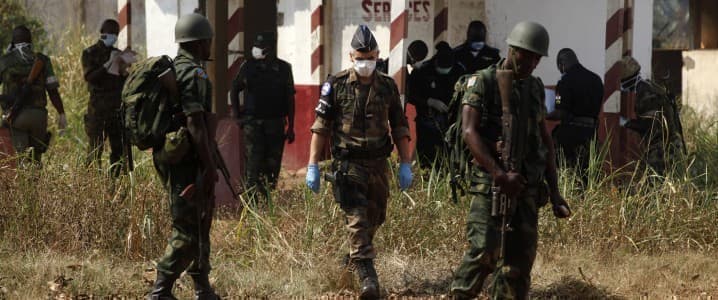Much of the 2020 media discussion has recently been taken over by the prospects of crude demand never really recovering from the ongoing pandemic-induced market slump. That would have been a really sad development for those young countries that did not really manage to assess their own bounties, all the while some of them might be really hot. The Central African Republic (CAR) might be the hottest nation of them all – it is hot in the immediate sense of averaging 25° C on an annual basis, hot in the figurative sense of bordering proven oil-producing regions but never really getting to adequate exploration work and even hotter when it comes to providing security to prospective oilmen.
CAR has a lot of bad reputation to shed, holding the lamentable record of having the world’s lowest GDP per capita rate at purchasing power parity, being the worst place to be a child globally, being the worst gauged nation in the UNDP’s Human Development Index. Although the protracted civil war that started way back in 2012 has certainly attributed to such a dire state of things, even ending it might not provide the final solution for the landlocked war-torn republic. Since the Central African Republic is still subject to UN sanctions (extended until July 31, 2021) amid recurring attacks on MINUSCA convoys and staff generally, international organizations have been warning that despite some success in getting the hostilities number down, the risk of kidnappings and ambushes still remains too high.
Ever since the Central African authorities have started to conduct roadshows to present the open acreage they have available, the issue of physical security was raised many times, to which officials unalterably replied that the political dimension has changed in the country following the 2019 UN-brokered peace deal between the government and rebels. Bangui officials are partially right in saying this, even the UN admits that human rights violations went down significantly in the past year, however that does not mean that they are still not there. If an international investor is to commit to a project in CAR, security guarantees will be paramount to the endeavor going forward successfully – so far, the only ones to move into Central African Republic were Chinese firms. Related: Can Colombia Replicate Brazil’s Offshore Oil Boom?
The Chinese were not the first to drill an exploratory well in the Central African Republic, Esso was back in 1986, with signs of a commercially viable oil deposit found in what is today Block A. Yet despite the promise, ESSO’s drilling never went beyond the first phases of exploration. Now two Chinese companies are looking to build upon the seismic surveying data of those halcyon days, buttressed by two seismic sets of their own – two Chinese firms (PTIAL International and PTI-IAS, both owned by China’s first-ever oil company Shaanxi Yanchang Petroleum) were about to drill 3 wells in the 2020/2021 season, however, COVID-19 kicked in and seemingly postponed the spudding. Interestingly, the assumed exploratory well in the PTIAL-operated Block A is located quite close to the original ESSO drilling spot.
As things stand today, Blocks A and B, both bordering on Chad, are operated by the abovementioned Chinese firms, whilst Block C in the country’s south is with the South African DIG Oil. The Central African authorities are putting Blocks D, E and F on offer located just below Blocks A and B within the same Salamat/Doseo Basin (of them, Block D is by far the largest, totaling almost 27 000 km2). Hypothetically, the list of proposed blocks might be even wider as all the other basins remain untapped, like the Mouka-Oudda Basin in the center of the country, however the government has decided not to waste time on reservoirs that carry not only a security risk but also a risk of being non-commercial. The government of the Central African Republic still negotiates its concession agreements directly, with the exploration period provided for an initial period of 4 years. The royalty rate for oil production is set at 12% and gas production is fixed at 5%.
The entire oil-bearing Sud Province, an area assessed to be as vast as 980 000 km2, encompasses the territories of Central African Republic, Chad, Sudan, South Sudan and Ethiopia. Moving from the Melut and Muglad Basin in the west, the Doseo Basin forms the western frontier of the Sud Province, shared by Chad and CAR. Success stories from CAR’s neighbors should ideally attest to the occurrence of commercial crude reserves. The Chadian flagship grade Doba is produced a couple dozen kilometers from the CAR-Chad border and since the southern side of the adjacent Doseo Basin is virtually unassessed, it might yield new discoveries and fields that heretofore were thought to be out of bounds.
The US Geology Service put forward in its 2014 assessment of the region’s untapped reserves a risked estimate of 7.1 BBbls oil and 165 TCf associated gas, and although much of this will be located within Chad the Central African Republic will still wield a lot of hydrocarbons. Should anyone in CAR mark a huge discovery of a commercial nature, transportation need not necessarily be an issue – the thing is that the 225kbpd Chad-Cameroon oil pipeline that takes oil from the Sahel zone to the Gulf of Guinea can be easily tied into, if need be. Still, for this to happen, one of the hottest countries on earth would need to get a bit more predictable and just a tad safer.
By Viktor Katona for Oilprice.com
More Top Reads From Oilprice.com:
- The Road To Recovery Is Long For Oilfield Services
- Is This The Key To Cheaper Solar Power?
- M&A Heats Up In Canadian Oil Patch


















